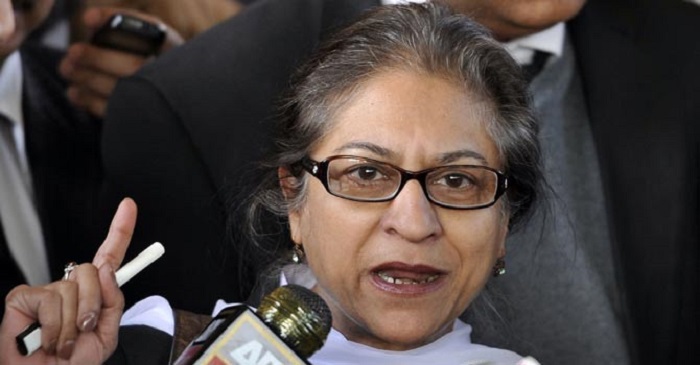Alwaght- The UN has picked Asma Jahangir to replace Ahmad Shaheed as the UN special rapporteur on situation of human rights in Iran. The so-called human rights activist Jahangir is known for her strong opposition to the Islamic law in the field of family and women and her indubitable support for Bahá'í sect which is banned in Iran for its anti-Islamic ideology and is branded in Iran as a "misguided sect.
Asma Jilani Jahangir is ostensibly a human rights activist and is one of the leaders of Pakistan Lawyers' Movement. She was born in 1952 in Pakistan's Lahor, and is a lawyer. She graduated from the University of the Punjab and Kinnaird College for Women in Lahore. She is basically known as founder and chief of the Human Rights Commission of Pakistan. From 1995 to 2000, Jahangir was the UN special rapporteur on extrajudicial executions and from 2004 to 2010 was the UN special rapporteur on freedom of religion or belief for minorities. She served two times in prison in 1983 and 2007.
But the fact is that she is against the Islamic rules especially in women and family fields. Choosing such a woman as a UN special rapporteur on situation of human rights in Iran will have worrisome outcomes. In 1981, she along with her sister Hina Jahangir founded the all-woman law firm that was named Women Action Assembly, and in 1982 Jahangir rose as top opposition figure and organizer of demonstrations against a plan for Islamization of the country launched by the incumbent President and army chief Muhammad Zia-ul-Haq. In one of her interviews at that time she said that the religious family laws considered very few rights for women. She added that they needed amendment because Pakistan could not live in isolation. Jahangir continued the Pakistani women cannot be in chains while other women are making progress.
During all of these years, she was the determined opponent of the most basic laws of Islam including the law of Qisas (retaliation) as well as the need for guardian’s permission for marriage of the girl. Jahangir personally took cases of many of women that married without permission from their guardian or the girls who sought to arrange marriage without the guardian’s go-ahead. Another part of her clients included women and girls who were sentenced to Islamic punishment of Hadd for adultery according to the Islamic laws in the different Pakistani courts.
Jahangir never declined to express strong and clear opposition to implementation of Islamic hudud (punishments). Although Jahangir perhaps is a popular and renowned figure among a part of the Pakistani community, namely the middle classes of large cities, other parts of the Pakistani society that know her and are labeled nationalist Muslims in terms of ideology and beliefs– they account for a majority of the Pakistani people– don't look at her positively. On the other side, the Pakistani army for some reasons has announced Jahangir persona non grata to the national security.
Due to what was mentioned, it can be clearly noted that from now on Islamic Republic of Iran should expect strong reports of her on human rights violations in Iran and most importantly her attacks at the basic Islamic laws in family and women fields. But beside the mentioned cases one of the most controversial charges about Asma Jahangir and her family in Pakistan is her being from Qadiani sect which originally derived from Ahmadiyya sect that was founded by Mirza Ghulam Ahmad. This issue was exposed in 2010 during competitions for post of head of lawyers association of Supreme Court of Pakistan. The interesting point is that according to many researchers there is a great deal of fundamental similarity between Ahmadiyya sect in India and Bahá'í sect in Iran in late 19th century. As the Mirza Ali Muhammad Bab founded the Bab sect– as the origin of Bahá'í sect– with a support from the colonial Britain to create gaps among the Shiite Muslims, Mirza Ghulam Ahmad also under support of Britain founded a sect to break unity of the Indian Muslims.
Asma Jahangir from 2004 to 2010 was the UN special rapporteur on freedom of religion or belief for minorities and during her term in office she several times criticized Tehran for what she called violation of rights of Bahá'ís in Iran.
All these cases indicate that the person that will be chosen as special rapporteur on situation of human rights in Iran by the UN in a month is in fact a feminist and advocate of Bahá'í rights. The Iranian international affairs and human rights officials are supposed to watch closely the possible events and the ostensibly human rights measures of the UN special rapporteurs.



























